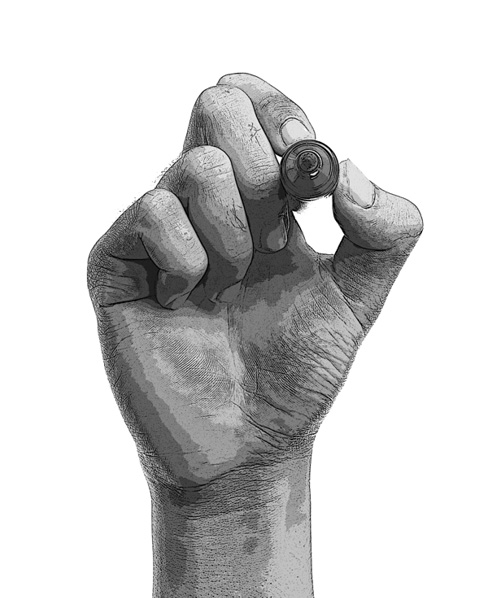Choosing a Topic & Name
There is an art to blogging and an art to blogging effectively. Finding your niche can be pretty difficult—there’s so many different subjects to choose from. This Section will help you discover where your passions are and how to turn those passions into an eye-catching name that takes over the internet. OK, maybe not a name that takes over the internet, but at least a name that has a nice ring to it. Read on to find your niche.
What Should I Blog About?

A good blog entertains, enlightens, captures interest, fascinates, sparks debate, and inspires conversation. A blog needs to be unique, invigorating, and useful.
Since there are millions of blogs out there, you need to be unique. Why is someone going to look at your food blog when there’s another, more popular blogger talking about the same things?
It can be difficult to find your place in the blogging world, but to get started, let’s get your creative juices flowing with 50 ideas.
If one of these topics seems like something you’re interested in, start thinking about how you can add something unique to the subject area.
- Self improvement
- Health/fitness
- Travel
- Animals
- Personal development
- Communication skills
- Self-defense
- Recipes
- Technology
- Bullying
- Tutorials
- DIY projects
- Relationship advice
- Friend advice
- Career/jobs
- Finance
- Ghost-hunting
- Video games
- Gardening
- Social media
- Photography
- Blog & website tips
- Confidence & self-esteem
- Self-employment
- How to write well
- Interior design
- Life skills for high school/college students
- Sports
- Public speaking
- Meditation
- Family
- Musical instruments
- Music in general
- Movie reviews
- Book reviews
- Music reviews
- Simple living
- History
- Politics
- Celebrities
- Tourism
- Shopping
- Fashion
- Beauty
- Makeup
- Product reviews
- Parodies
- Jokes
- Interviews
- News
| ☞ Fast Fact:The three most popular blogs of all time are Huffington Post (news), TMZ (celebrities), and Business Insider (business). |
The list doesn’t end here — what are you good at? What interests you? When you get home from school, what’s the first thing you get excited about? That might be your perfect starting point.
What’s in a Name?
If you haven’t chosen your topic yet, that’s all right. If you have, you might be ready to start thinking about creating a title for your blog. Titles attract attention. Make them capture the essence of your blog. If you fail to capture attention with your blog title, readers won’t flock to you.
Keep in mind that good titles drive your overall readership. Most people scan Web pages and only stop when something catches their attention. If your title doesn’t do that, you will lose potential followers.
Step 1: Do some comps
If you’ve ever heard of the term “comps,” it has probably been related to real estate. Realtors generally take a look at houses similar to yours, and then they tell you how much yours is worth based on those comparables.
Well, you want to do the same thing when you’re choosing a name for your blog.
Let’s Atlantic Publishing Group, Inc. for an example:
Topic: We want to create a blog for teens and young adults that are interested in nonfiction books — we want to create a place where they can interact with us and start discussions.
What we’re starting with: The name of our publishing company is Atlantic Publishing Group, Inc. That’s all we really have to work with at this point.
What everyone else in our niche is doing: Well, we did a Facebook search for the three biggest publishing companies in the world — Penguin Random House, Simon & Schuster, and HarperCollins. Here’s what their young adult Facebook pages are called:
- Penguin Teen
- SimonTEEN
- HarperTeen
Our name became clear just from looking at the comps.
Final name: AtlanticTeen.
You won’t always have this kind of crazy-good luck, but it can be important to see what else is out there for other reasons, too. You don’t want to start up a blog called LifeHacks just to find out that one of the most popular blogs in the world is called LifeHacker.
You also want to see what kinds of things they’re talking about. You don’t want to double them — try to find your niche. You can use their posts as inspiration for your own, but if you post the same things, no one will find your blog necessary.
Step 2: Make a list of keywords
If you aren’t fortunate enough to have a company name to start out with, you’re starting from absolute scratch. In this scenario, it’s really helpful to sit down and make a list of words associated with your topic.
For example, if your topic is music, you might write words like these: rhythm, beats, melody, tune, acoustic, soul, fusion, refrain, song, lyric, chime, descant, resonance, musicality, and so on.
If you can’t think of anything and you’re staring at a blank piece of paper, hop on to www.thesaurus.com and start looking for synonyms. Even the most creative of people get stuck.

Once you have your list made up, scan through it and look for words that appeal to you. Maybe it’s the way the word looks on the page, the way it sounds, or the connotations it has — try to think of how you could use that word in a title.
Step 3: Make a list of possible names
So many lists, we know, but once you start brainstorming actual names, write every single one of them down. Try to crank out at least 15 names. It doesn’t matter how stupid you think they sound — you might find that mixing and matching a few of the names brings you to the winner.
When you have a huge list, whittle them down by crossing out the ones you know you don’t love. When you can come down to a select few, run them by friends and family. They might notice something that you don’t —a strange affiliation with a word, a double meaning you didn’t notice, or even the fact that it sounds funny when you say it out loud.
Once you have everyone’s input, you should have a winner on your hands! Do a quick Web search to make sure it doesn’t already exist. You wouldn’t want to double someone else, especially if the name is trademarked or copyrighted.
| Top 5 Strangest BlogsBreaded Cats (www.breadedcats.com)Hungover Owls (http://hungoverowls.tumblr.com)Accidental Chinese Hipsters (http://accidentalchinesehipsters.tumblr.com)Men Taking Up Too Much Space on the Train (http://mentakingup2muchspaceonthetrain.tumblr.com)Kim Jong-Il Looking at Things (http://kimjongillookingatthings.tumblr.com) |
| FROM THE EXPERTS: EMILY ROBBINS |  |
| Find her at: www.emilyrobbins.com/how-to-blog. | |
| So, you want to start a new blog. Maybe you don’t have much experience with blogging, so you don’t think it’s that big of a deal which platform you choose or whether you have your own domain name. Well, think again.Don’t fall victim to the disaster that I landed myself in, where I started casually blogging and ended up regularly blogging and hating the platform I was using but can’t easily switch because I stupidly put my blog on a subdomain of TypePad (http://blogging.typepad.com).Now I’m at TypePad’s mercy. They own my behind because they own my address — even though I’m paying $150+ a year for their service. The same could happen to you whether it’s a subdomain on typepad.com, blogspot.com, or wordpress.com.By not having your own domain name, if you ever decide to move to another blogging platform you run the risk of losing all (or a lot) of your traffic, your search engine rankings, all of your hard earned incoming links, etc. because you cannot take your URL with you.How are you going to redirect your traffic to your new blog when you have NO ability to, say, set up a 301 Permanent Redirect? Which, for those who are wondering, would both:Automatically redirect human visitors to your new blog siteTell the search engines that your blog has permanently moved and gives it the new locationDomain names are cheap — about $9 a year for a single one, as low as $6.75 a year if you own more than 50. There is NO excuse to not have your own domain name for your blog. You will regret it at some point down the road if you don’t start out with your own domain name.GoDaddy.com is the site that I use to register my domain names, although there are numerous other options, such as $5.99 domain names at 1&1, and, if you only need a single domain name, the cheapest option is domain names from Yahoo! for only $2.99.The irony here is that I actually own a lot of domain names and I genuinely can’t fathom why I didn’t just use a domain of my own when I started my blog.Just to clarify, my point is that you need to own your own domain name so the URL for your blog points to a domain you own and control. It’s okay to use a subdomain off a domain that you own, but not one that belongs to someone else, such as that of a hosted service like typepad.com.And it’s okay to use a hosted solution — just make sure you pick one (like typepad.com or blogger.com) that allows you to use your own domain name (and always reference your blog’s URL with your own domain) so that if you ever decide you want to go elsewhere, at least you’ll be able to take your traffic with you. And it’s also a good idea to check to see if whatever blogging platform you start with has the ability to export your posts (and comments/trackbacks) for easiest porting of your site to another platform.Emily Robbins created her blog (www.emilyrobbins.com/how-to-blog) as she journaled her quest to teach herself how to blog. It has evolved into a blogging how-to guide, with tips and tricks for both new and experienced bloggers. The site includes reviews and comparisons of various blogging platforms, a comprehensive list of over 615 WordPress themes to customize the look and feel of your blog, tutorials for solving specific problems, and much more. | |

